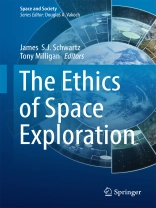This book aims to contribute significantly to the understanding of issues of value (including the ultimate value of space-related activities) which repeatedly emerge in interdisciplinary discussions on space and society. Although a recurring feature of discussions about space in the humanities, the treatment of value questions has tended to be patchy, of uneven quality and even, on occasion, idiosyncratic rather than drawing upon a close familiarity with state-of-the-art ethical theory. One of the volume’s aims is to promote a more robust and theoretically informed approach to the ethical dimension of discussions on space and society. While the contributions are written in a manner which is accessible across disciplines, the book still withstands scrutiny by those whose work is primarily on ethics. At the same time it allows academics across a range of disciplines an insight into current approaches toward how the work of ethics gets done. The issues of value raised could be used toinform debates about regulation, space law and protocols for microbial discovery as well as longer-range policy debates about funding.
表中的内容
Forword, .- Volume Introduction, .- Section I .- Colonization, .- Section II – Normative Ethics, .- Section III – Humanism and Posthumanism, .- Section IV – Ethics and Law, .- Section V – The Debate on Microbial Value, .- Section VI – Planetary Protection, .- Glossary of Terms, .- Index.
关于作者
Tony Milligan is a lecturer in ethics with the Department of Philosophy at the University of Hertfordshire. His research focuses upon the relations between the human and the non-human with an emerging specialism in the ethics of space. He is the author of Beyond Animal Rights (2010), Love (2011), Civil Disobedience: Protest, Justification and the Law (2013), Nobody Owns the Moon: the Ethics of Space Exploitation (2015), Animal Ethics: The Basics (forthcoming, June 2015), the co-editor of a volume of essays on Love and its Objects (2014) and the guest editor of a recent (November 2014) special edition of the journal Space Policy on space ethics.
James S.J. Schwartz teaches philosophy at Wichita State University. His research interests include: philosophical and ethical issues related to space science, law, and policy; environmental ethics; philosophy of mathematics; and metaphysics. His publications have appeared in Space Policy, Environmental Ethics, Ethics & the Environment, Philosophia Mathematica, and in other volumes of Springer’s Space and Society series.












